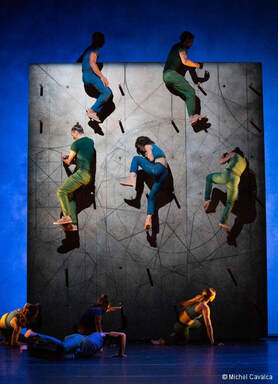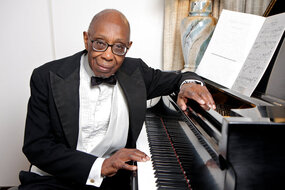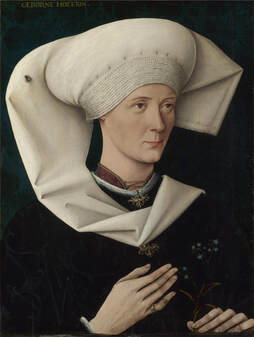|
 Vertikal Click here for tickets After tackling the third dimension with Pixel, Choreographer Mourad Merzouki teams up here with aerial-technique specialist Retouramont to open up a new field of hip-hop possibility. “The dancer’s relationship with the floor is totally altered,” he says. “The dancer is by turns the base and a marionette animated by the counterweight of his partners.” With a strings/electronic score by Armand Amar, Vertikal marks out new vanishing points in space, while retaining the vocabulary of hip-hop dance.  The Phillips Collection Livestreams- A portrait of George Walker Click here for tickets One of my favourite art galleries in the world is the Phillips Collection in Washington DC, a beloved holdover from the years I lived in that great city. In recent years the Phillips has begun curating some terrific chamber music concerts and, even more recently, they’ve started livestreaming them for the benefit of those of us who don’t live in that great city. On the 6th, next Sunday, as part of their season of Leading International Composers, there’s a livestreamed concert-profile of composer George Walker. 2022 marks 100 years since Walker’s birth in Washington, DC. Walker was a trailblazer within the landscape of twentieth and twenty-first century American music. He was the first African-American performer to appear in performance with the Philadelphia Orchestra and the first African-American musician to receive a doctoral degree from Eastman. Walker’s many firsts are perhaps best captured by his singular achievement in 1996: the Pulitzer Prize for Lilacs for Voice and Orchestra. Despite Walker’s many achievements, much of his chamber music is not widely known. Cellist Seth Parker Woods, who curates this concert-profile, has made advocacy for Walker’s music a central mission. Parker Woods brings together a stellar group of musicians for a portrait that explores several decades of Walker’s career and many sides of his musical development. Gregory Walker, George Walker’s son, performs Bleu for unaccompanied violin (2011) and joins pianist Natalia Kazaryan for the Sonata No. 1 for Violin and Piano (1958). Parker Woods performs the Sonata for Cello and Piano (1957) with pianist Andrew Rosenblum. Clarinetist Zachary Good performs Walker’s Perimeters (1966) and joins Kazaryan and Rosenblum in Walker’s Five Fancies for Clarinet and Piano Four Hands (1975). Sunday Nov 6 at 4pm and then available on demand for 48 hours. $15  The Book of Dust – La Belle Sauvage - National Theatre at Home Click here for tickets Set twelve years before his epic His Dark Materials trilogy, this gripping adaptation of The Book of Dust - La Belle Sauvage revisits Phillip Pullman's fantastical world in which waters are rising and storms are brewing. Two young people and their daemons, with everything at stake, find themselves at the centre of a terrifying manhunt. In their care is a tiny child called Lyra Belacqua, and in that child lies the fate of the future. And as the waters rise around them, powerful adversaries conspire for mastery of Dust: salvation to some, the source of infinite corruption to others. Eighteen years after his groundbreaking production of His Dark Materials at the National Theatre, director Nicholas Hytner returns to Pullman's parallel universe. This is a gripping adaptation of Philip Pullman’s prequel to His Dark Materials trilogy, adapted by Bryony Lavery for the Bridge Theatre.  Why Does This Lady Have a Fly on Her Head? – National Gallery Click here to watch This charming little film from the National Gallery attempts to answer this question about this ‘Portrait of a Woman of the Hofer Family'. Francesca Whitlum-Cooper, The Myojin-Nadar Associate Curator of Paintings 1600–1800 at the National Gallery, investigates this portrait's unusual addition. Almost all we know is that the picture is Swabian, dating from about 1420 and that it was a gift to Queen Victoria from her husband, Prince Albert and, in turn, given to the nation by Queen Victoria at the Prince Consort's wish in 1863. Francesa Whitlum-Cooper tells us much more and does it most entertainingly. Pocket Review  Good – Harold Pinter Theatre I was just as shocked by the revival of C.P. Taylor’s Good as I was at its premiere in 1981 when it starred Alan Howard as the nice, ordinary university professor who becomes drawn, by a spiral of small moves, into the web of National Socialism in the 30s. Now it stars an exemplary David Tennant who is, if anything, even more believable as he relives each entirely comprehensible step into the moral hollow. His career will be hurt if he doesn’t join the Nazi party, his boss tells him. Well, what harm can it do? He really should show willing by participating in the burning of books considered degenerate by the higher-ups. Well, so long as he can keep his copies of the forbidden books, he can bring himself to do that. It's just a gesture, right? His best friend is Jewish but he assures him that there’s really no danger to him or his family. It’s just name-calling after all and will soon surely just blow over. He doesn’t have to call it out, does he? Of course not. After all, Halder is a good man, a good family man, although he falls in love with one of his students who draws him even further into the maelstrom and encourages him to leave his good marriage. As Halder relives his steps into the abyss, he is pursued by a persistent musical soundtrack which eventually morphs into a Concentration Camp band. We come to realise that this good man is a moral vacuum, the embodiment of “go along to get along” but we see, through this terrifying play, exactly how he gets to the inevitability of what happens when ‘good’ becomes evil. The playwright is telling us that this could happen to any of us who think of ourselves as good people. All it takes is carelessness and hubris and then, suddenly, it is too late. We have become what we most dread, not ‘good’ at all. What was originally a big cast play has been deftly adapted by its director Dominic Cooke for a cast of three who play all the parts – David Tennant as Halder, Elliott Levey as his best friend Maurice, but also as the Party official, Adolf Eichman and others, and Sharon Small as his wife, his mistress, his boss and others. They are all terrifyingly, appallingly, well, good.
0 Comments
|
AuthorRuth Leon is a writer and critic specialising in music and theatre. Archives
March 2024
Categories
All
|
 RSS Feed
RSS Feed
